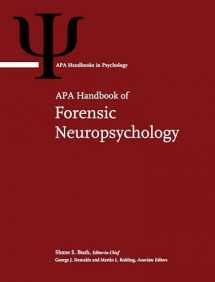
APA Handbook of Forensic Neuropsychology (APA Handbooks in Psychology® Series)
Book details
Summary
Description
The application of clinical neuropsychology to forensic questions and issues is growing at a tremendous rate. The APA Handbook of Forensic Neuropsychology covers the scientific and clinical neuropsychological advances and their application in forensic contexts. To accomplish this goal, this handbook (a) presents the theoretical, statistical, and ethical foundations of forensic neuropsychology; (b) describes current assessment measures and procedures employed in forensic neuropsychology, with an emphasis on their empirical evidence base; (c) integrates recently published empirical literature involving commonly encountered disorders and special populations; (d) describes reporting, admissibility, and testimony issues involving neuropsychology in forensic matters; and (e) describes future directions involving the intersection of clinical neuropsychology and legal matters.


We would LOVE it if you could help us and other readers by reviewing the book
Book review



